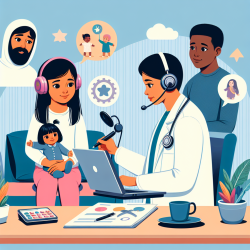Empowering Futures: How Conditional Cash Transfers Can Transform Young Lives
In the field of speech-language pathology, we are constantly seeking innovative ways to improve outcomes for children. One promising avenue is through the implementation of data-driven social protection programs, such as conditional cash transfers (CCTs). A recent study titled The Impact of a Conditional Cash Transfer on Multidimensional Deprivation of Young Women: Evidence from South Africa’s HTPN 068 provides compelling evidence of the positive effects of CCTs on young women in South Africa. This blog explores how practitioners can leverage these findings to enhance their practice and encourage further research.
Understanding Multidimensional Poverty
Multidimensional poverty extends beyond mere financial deprivation, encompassing various aspects of well-being, including education, health, protection, relationships, economic agency, and psychosocial well-being. The study conducted in South Africa's rural areas utilized a novel individual-level measure to assess the impact of CCTs on these dimensions among young women.
Key Findings from the Research
The research revealed that CCTs significantly reduced multidimensional deprivation among participants. The cash transfers improved economic agency, reduced experiences of violence, and enhanced relationships. These findings highlight the potential of CCTs to address multiple aspects of poverty simultaneously, aligning with the Sustainable Development Goals (SDGs) that aim to eradicate poverty in all its forms.
Implications for Practitioners
For practitioners in speech-language pathology, these findings underscore the importance of adopting a holistic approach to child development. By understanding the broader socio-economic factors that influence a child's well-being, practitioners can tailor interventions to address specific needs. Here are some practical steps practitioners can take:
- Integrate Multidimensional Assessments: Incorporate assessments that consider economic, social, and psychological factors affecting children and their families.
- Collaborate with Social Programs: Partner with organizations implementing CCTs to provide comprehensive support to children and their families.
- Advocate for Policy Change: Use data-driven evidence to advocate for policies that support multidimensional poverty reduction, benefiting children's overall development.
Encouraging Further Research
While the study provides valuable insights, further research is needed to explore the long-term effects of CCTs on child development. Practitioners can contribute by engaging in collaborative research projects, sharing case studies, and disseminating findings within professional networks. By fostering a culture of continuous learning and evidence-based practice, we can collectively enhance outcomes for children.
Conclusion
The study on CCTs in South Africa demonstrates the transformative potential of social protection programs in reducing multidimensional poverty among young women. By embracing data-driven approaches and advocating for holistic interventions, practitioners in speech-language pathology can play a pivotal role in creating positive, lasting change for children. To delve deeper into the original research, please follow this link: The Impact of a Conditional Cash Transfer on Multidimensional Deprivation of Young Women: Evidence from South Africa’s HTPN 068.










